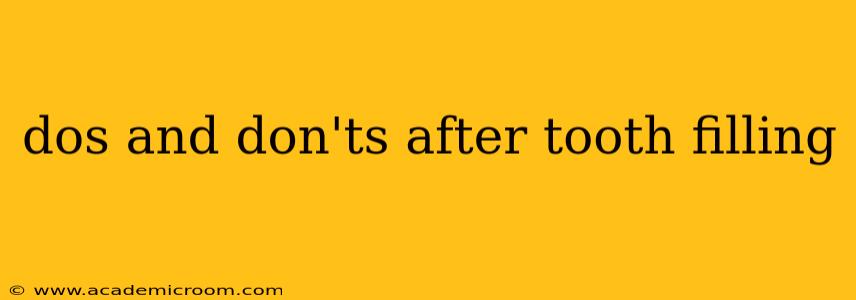Getting a tooth filling is a common dental procedure, but proper aftercare is crucial for ensuring a successful outcome and preventing complications. This comprehensive guide outlines the essential dos and don'ts following your tooth filling, helping you achieve optimal oral health.
What to Do After a Tooth Filling
Following your dentist's specific instructions is paramount, but here are some general dos to prioritize:
1. Manage Pain and Swelling:
After a filling, some discomfort is normal. Your dentist may prescribe pain medication; follow the instructions carefully. Applying a cold compress to the affected area can help reduce swelling. Remember to apply the cold compress intermittently, for 15-20 minutes at a time, followed by a break.
2. Gentle Cleaning:
Once the numbness wears off, gently brush and floss your teeth, being extra cautious around the filled tooth. Avoid vigorous brushing or flossing near the filling site for at least 24 hours to prevent irritation or dislodging the filling. Use a soft-bristled toothbrush and a gentle touch.
3. Maintain a Healthy Diet:
Avoid extremely hot or cold foods and drinks for the first few days as these can cause sensitivity. Chewing on the affected side should be minimized initially. Stick to soft foods like yogurt, mashed potatoes, or applesauce until you feel comfortable chewing normally again.
4. Monitor for Complications:
Keep an eye out for any unusual symptoms such as persistent pain, swelling, increased sensitivity to hot or cold, or any signs of infection (pus or redness). If you experience any of these, contact your dentist immediately.
5. Schedule Follow-up Appointments:
Your dentist will likely schedule a follow-up appointment to check on the healing progress and ensure the filling is stable. Attending these appointments is vital for long-term oral health.
What Not to Do After a Tooth Filling
Neglecting these points could compromise your healing process and the longevity of the filling:
1. Avoid Harmful Substances:
Refrain from smoking or chewing tobacco as these can interfere with the healing process and potentially damage the filling. Avoid alcohol consumption for at least 24 hours, as it can also interfere with healing.
2. Don't Bite Down Too Hard:
Avoid biting down hard on the filled tooth, especially in the initial hours after the procedure. This prevents the filling from becoming dislodged or damaged. Focus on chewing on the opposite side of your mouth.
3. Don't Neglect Oral Hygiene:
While gentle cleaning is crucial, completely neglecting oral hygiene is detrimental. Maintain a consistent brushing and flossing routine, but remember the gentle approach mentioned above.
4. Don't Ignore Sensitivity:
Some sensitivity is expected, but persistent or intense sensitivity is not normal. Contact your dentist if your sensitivity is severe or doesn't subside after a few days.
5. Don't Delay Necessary Treatment:
If you experience any unusual pain or discomfort, don't delay seeking professional dental care. Prompt attention to potential problems is key to preventing more serious issues.
Frequently Asked Questions (FAQs)
This section addresses common questions regarding aftercare following a tooth filling.
How long does it take for a tooth filling to heal completely?
Complete healing time varies depending on the individual and the extent of the procedure. Most people experience complete healing within a week or two. However, it might take longer for larger fillings or more extensive procedures.
What should I do if my filling falls out?
If your filling falls out, contact your dentist immediately. Avoid chewing on that side of your mouth to prevent further damage.
Can I drink alcohol after a tooth filling?
It's generally recommended to avoid alcohol consumption for at least 24 hours after a filling to allow for proper healing. Always follow your dentist's specific instructions.
Is it normal to experience some sensitivity after a filling?
Yes, some sensitivity to temperature is normal in the days following a filling. This sensitivity usually subsides within a week or two. However, persistent or severe sensitivity should be reported to your dentist.
How long should I wait before returning to my normal diet?
You should be able to resume your normal diet gradually after a couple of days, but initially focus on softer foods to avoid putting too much pressure on the filled tooth.
By following these dos and don'ts, and keeping in close contact with your dentist, you can ensure a smooth recovery process and enjoy the long-term benefits of your tooth filling. Remember, your dentist is your best resource for personalized advice and care.
